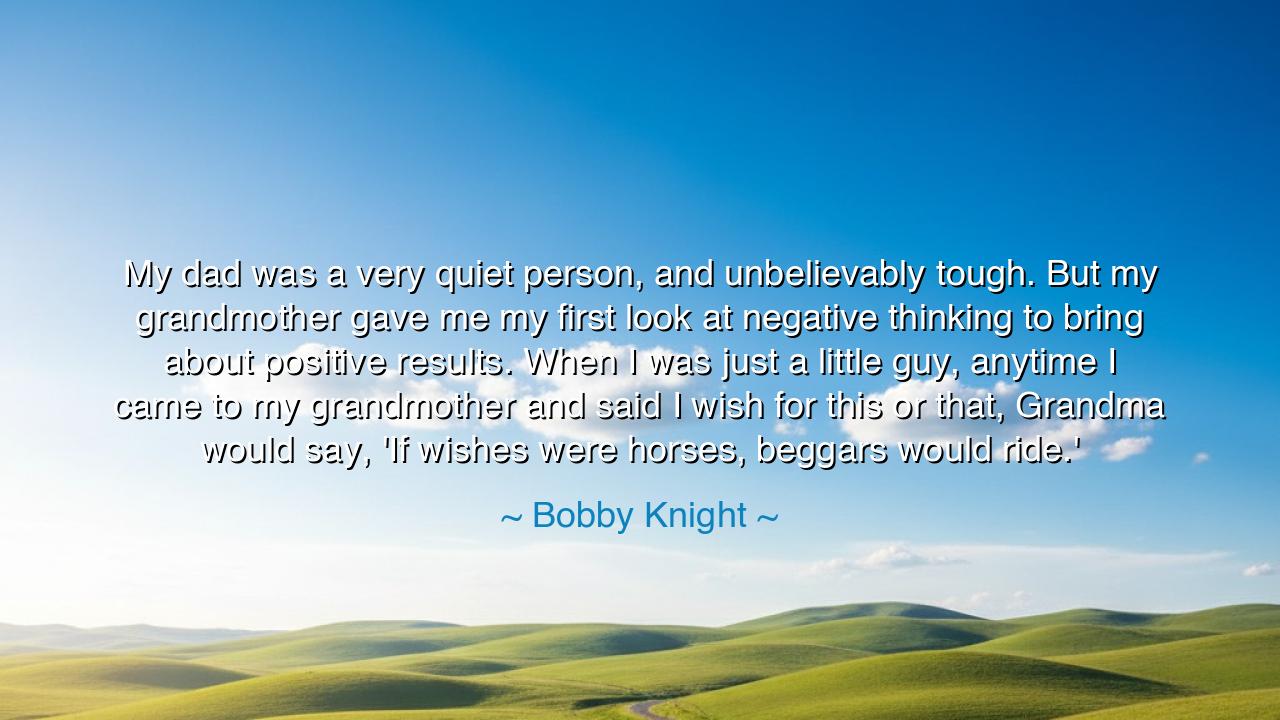
My dad was a very quiet person, and unbelievably tough. But my
My dad was a very quiet person, and unbelievably tough. But my grandmother gave me my first look at negative thinking to bring about positive results. When I was just a little guy, anytime I came to my grandmother and said I wish for this or that, Grandma would say, 'If wishes were horses, beggars would ride.'






The words “My dad was a very quiet person, and unbelievably tough. But my grandmother gave me my first look at negative thinking to bring about positive results. When I was just a little guy, anytime I came to my grandmother and said I wish for this or that, Grandma would say, ‘If wishes were horses, beggars would ride’” were spoken by Bobby Knight, the fiery and legendary basketball coach whose discipline, intensity, and demand for excellence became his defining creed. Beneath this reflection lies a philosophy as old as struggle itself — that strength is born not from comfort, but from confrontation; that wisdom often wears the garments of sternness; and that success belongs not to those who wish, but to those who work.
Knight speaks first of his father, a man of few words and iron will. In this image we see the archetype of the silent teacher — the one who leads not by command, but by example. The ancients revered such men: they are the pillars upon which character is built, men whose toughness is not cruelty, but conviction. From his father, Knight learned that life yields not to complaint, but to persistence. Yet it was his grandmother, with her sharp, practical wisdom, who gave him the lesson that would define his philosophy: the futility of wishing without action. Her saying, “If wishes were horses, beggars would ride,” is an ancient English proverb, dating back to the 16th century, born from the folk truth that desire alone does not deliver — it is effort that moves the world.
When his grandmother spoke those words, she was not crushing the dreams of a boy; she was teaching him the discipline of realism. To wish is human, but to act is divine. To dream without effort is to invite disappointment, but to labor toward that dream is to summon destiny itself. The ancients, too, distrusted idle wishing. The Stoic philosopher Epictetus once said, “Don’t hope that events will turn out the way you want them to; desire that they will happen as they do happen, and you will go on well.” What both Epictetus and Knight’s grandmother understood is that wishful thinking can become a trap — a sweet poison that numbs the will to act. True power lies in translating desire into discipline, and imagination into endurance.
From this seed of truth grew the core of Knight’s coaching philosophy: mental toughness. He believed that victory does not belong to those who hope to win, but to those who prepare relentlessly. His players often said that his practices were harder than games, his standards nearly impossible. Yet behind the storm of his temper burned a single flame — the belief that excellence cannot be wished into existence; it must be forged, hammered, and refined. Like his grandmother, he used challenge as a tool of transformation. His so-called “negative thinking” — his criticism, his demands — was not meant to diminish, but to harden. The diamond, after all, is born only under pressure.
History is filled with teachers of this kind — those whose harsh truths become the soil in which greatness grows. Consider Socrates, who irritated his pupils with endless questioning until they learned to think for themselves. Or Thomas Edison, who famously said, “Genius is one percent inspiration and ninety-nine percent perspiration.” Edison’s words are the modern echo of Knight’s grandmother’s wisdom: the world does not bend to our desires simply because we wish it to. The bridge between dream and reality is effort. To teach this truth is an act of love, even when it wears the mask of severity.
In Knight’s remembrance, his grandmother’s lesson became a cornerstone not only of coaching, but of life. It is a call to accountability, a warning against the easy refuge of dreams untested by struggle. Her proverb reminds us that the human spirit is not meant to float upon the winds of desire — it is meant to walk the hard road, step by step, earning what it seeks. For only through effort does a wish gain weight; only through perseverance does hope take form. In this way, the so-called “negative” lesson becomes the most positive of all — for it calls forth the doer, the builder, the warrior within us.
The lesson, then, is clear and timeless: wishing is the seed, but work is the harvest. To live by wishes alone is to ride upon shadows; to act with purpose is to move mountains. When life tests you, do not sigh and dream of easier paths — take up the challenge with the quiet strength of Knight’s father and the fierce realism of his grandmother. Wish, yes — but then rise, act, and persist. For the gods favor not the dreamers who wait, but the workers who strive.
So remember, children of tomorrow: when you find yourself saying “I wish,” let those words be your signal to begin. Let your wish become a plan, your plan a labor, and your labor a triumph. For as Bobby Knight learned at his grandmother’s knee, the world owes nothing to the dreamer, but everything to the doer. The beggar who rides is not the one who wishes for a horse — it is the one who builds one.






AAdministratorAdministrator
Welcome, honored guests. Please leave a comment, we will respond soon